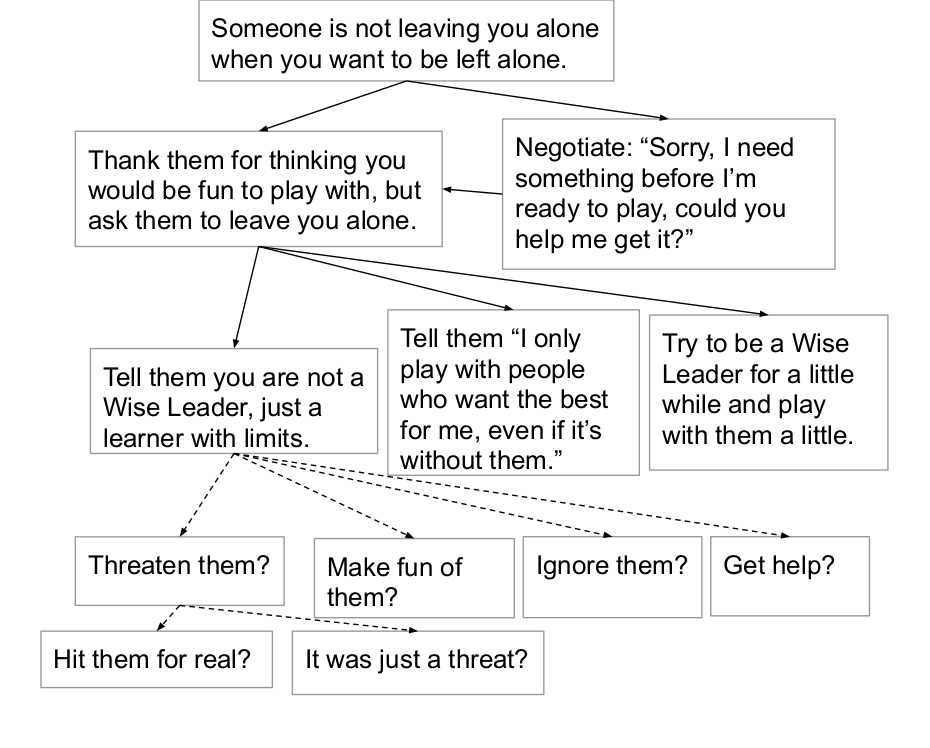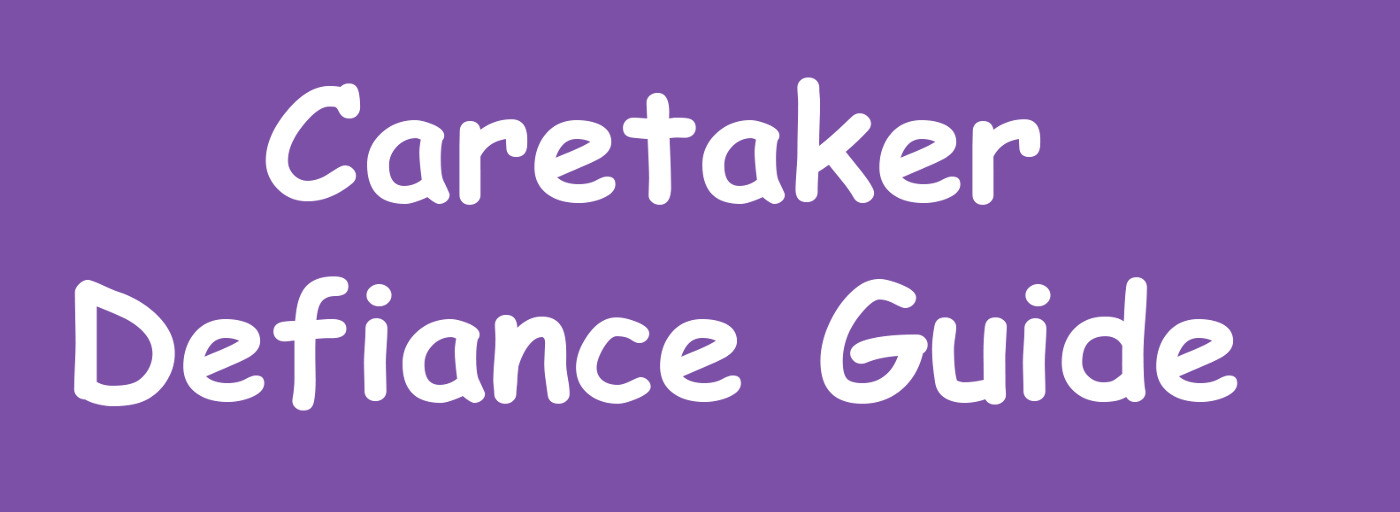Threats and Conflict
Sometimes Learners say things like, “If you don’t stop doing that and leave me alone, I will hurt you.”
You might be thinking, “People shouldn’t threaten to hurt others. I should carry on anyway as an unconventional way to communicate that they shouldn’t hurt others!”
Maybe they like to hurt people and are just looking for a chance to hurt someone. Doing something like that might be one way to get them to stop – or might they be thinking something else?
They may be thinking, “I really think that being left alone right now would be for the best,” and “I don’t actually want to hurt anyone, but if I say I do, they will leave me alone for sure!”
Maybe they are asking for something that everyone might deserve. (Do Learners deserve some time alone sometimes? Since we live in a world where people have limits, then the answer is probably yes.) In that case, you could say, “Thanks for letting me know you want to be left alone.” Then leave them alone without minding how harshly they communicated it. They will figure out by themselves that they don’t need to threaten you next time, since they are probably good and smart.
Things that every Learner may deserve that might be for the best:
| Being left alone: | “Nope, I’m gonna keep following you.” | “Thanks for letting me know you want to be left alone.” |
| Being called their own name: | “Nope, I’m going to keep calling you shorty.” | “Thanks for letting me know you want to be called James.” |
| Having a chance to be treated how they want: | “You want to be Superhero team leader? No, I’m always the leader.” | “Alright, you can have a turn being the leader.” |
| Having you stop doing something bothersome that can easily be stopped: | “You want me to stop playing with that noisy toy? Why don’t you try being not so bothered by the noise first?” | “Alright, I’ll stop playing this and do something else. Thanks for letting me know.” |
Maybe you can add or remove different things from this list if the other Learner agrees to it. Example: You could try to decide that everyone should keep on doing something, even if it bothers someone else, and see how that works. The next time someone does something that bothers someone else, they should just try to ignore it. Some friends just call each other odd nicknames all the time and aren’t bothered by it (but a Self Guider would probably be happy if they saw you giving everyone a chance to be treated how they wished).

There are lots of things you could try to get someone to leave you alone.
First, you could try one of these choices:
- You could say, “Thank you for thinking I would be fun to play with, but I would rather play by myself now.” This lets them know you still think they are a good person now, and have a chance to be really great in the future.
- Negotiate: Ask yourself, “I don’t want to play with them now, but what would need to change before I feel like it? Can they help me get it?” If you think of something, then you could tell them: “Sorry, but I need ___ before I’m ready to play. Could you help me get it?” Example: “Sorry, I need to finish planting my flowers before I’m ready to play. Can you help me?” You can use some ideas from the different ways to decide who gets what: the Equal Way, the Fair Way, and the Burden Way. Examples of each: The Equal Way: “I will play with you for five minutes if you leave me alone for five minutes,” or “I will play the game you want for five minutes if you play a game I want for five minutes.” The Fair Way: “I am really tired because I had to spend time with a Misguided Person today. I can play with you if we play what I want.” The Burden Way: “I’ll play with you, but you have to promise that the next three times someone wants to play with you, when you would rather be alone, you still play with them, OK?”
If they still won’t leave you alone, you can try three more choices:
- Tell them, “I’m not a Wise Leader. I am just a Learner with limits, so I don’t know enough to help you yet – sorry. If you let me have some time alone to think, maybe I can think of a way to help someone like you, but it might take a while.” This gives them some information from this book about how some people have negative qualities, and lets them know that you are a person with some negative qualities. They might really need that information in order for them to be their best.
- “Sorry, I only spend time with people who want the best for me, even if it’s without them.” This lets them know that you only spend time with people who want you to become your best self. If they want to spend time with you in the future, then they will have to change into that kind of person.
- Give their perspective a try. Maybe you actually do have enough energy to play with them? Say something like, “Wow, it really looks like you need someone to play with you right now,” to let them know you are putting a lot of thought into what they are going through, then try to be a Wise Leader and play with them as a Wise Leader would. Maybe you might even learn something new from playing with them.
If they still keep bothering you after you want to be left alone, what to do next is very uncertain. Without an Everything Knower or Self Guider’s help, no one really knows the best way to handle it.
- Would it be best to threaten them next? What would be best for the world? If someone didn’t threaten them, would they keep on going to people and discouraging them from being their best? If you make a threat by saying, “If you don't leave me alone, I’ll hit you,” does that mean you have to hit them afterward? If people follow the way of, “Lying is bad,” then should you? What if a Pretending Person who used the way, “If someone hits someone else, that proves they are bad!” saw you hitting them and did not want to understand the full situation? They would treat you like you were bad.
- Should you make fun of them? Say something you don’t mean, like, “Oh yea, I really want to play with someone who keeps bothering me. Ha ha, yeah right!”? Should you even call them names? Would it be less harmful than hitting them? Would it be for the best? No one knows yet.
- Would ignoring them be for the best?
- Should you get help? Are there any good people around whose job it is to help? Are there any caretakers? Yelling really loud for help might also be a good idea. Should getting help always be your first choice if you can?

